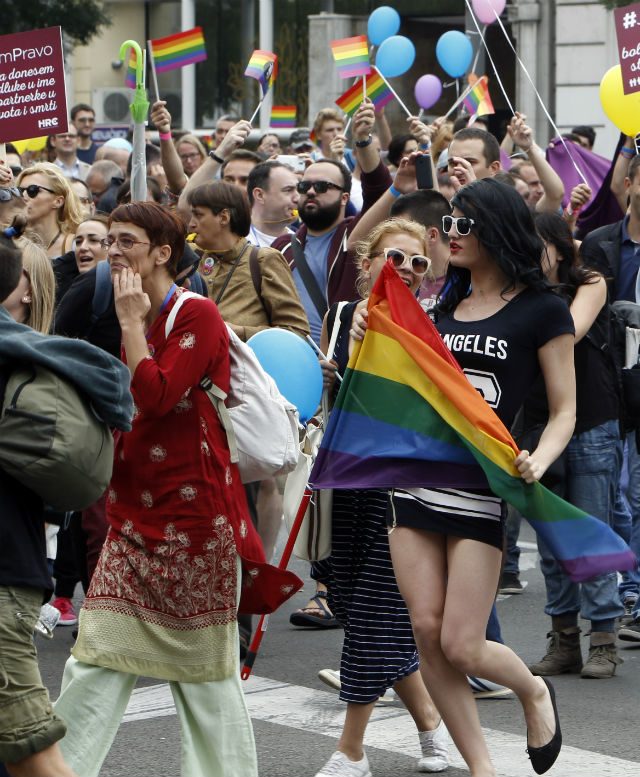SUMMARY
This is AI generated summarization, which may have errors. For context, always refer to the full article.

BELGRADE, Serbia – Belgrade’s Gay Pride parade, only the second since a ban was lifted, took place under tight security but without major incident Sunday, September 20, with participants urging European solidarity with the wave of migrants crossing the Balkans to reach the European Union.
“Europe open your gates,” read a huge black banner with pink letters held by activists next to a giant rainbow-colored flag waved at the front of several hundred participants.
“We, the entire LGBT (lesbian, gay, bisexual, and transgender) community, stand by our friends in trouble, by migrants who come everyday and, like us, only ask for their right to be happy,” prominent playwright Biljana Srbljanovic told the crowd.
Several other speakers also called for solidarity with the migrants and refugees, mostly from the Middle East, who have been passing through Belgrade for months on their wat from Turkey and Greece and on towards northern Europe.
In 2014, Serbian gays and lesbians staged their first incident-free Belgrade Pride Parade in 4 years, in what was seen as a test of the EU hopeful’s commitment to protecting minority rights.
At Belgrade’s first-ever Gay Pride march in 2010, hardline nationalists attacked participants and clashed with police, wounding 150 people and prompting officials to ban the parade for the next 3 years.
Sunday’s event passed without incidents amid tight security as thousands of riot police officers were deployed in the city center.
Warmer reception
Several armored vehicles, some with water cannons, were parked at main crossings in the downtown area where roads were closed to traffic from early morning.
Organizers said there had been significantly fewer threats of disruption by far-right groups than in previous years. It was such threats which had forced the government to cancel such events after 2010.
However, more than 50 people were arrested over alleged plans to attack participants in the gay pride parade, local media reported.
Police was not able immediately to confirm the figure to Agence France-Presse (AFP).
Organizers hailed what they called a warmer reception for 2015’s LGBT event.
The two-kilometer (1.5 miles) long march through the city center, from the seat of the Serbian government to Belgrade City Hall, was also attended by several leading Serbian officials, including Belgrade mayor Sinisa Mali and Jadranka Joksimovic, the minister in charge of Serbia’s bid for EU membership.
Belgrade has been under pressure to improve protection for minorities including the LGBT community since starting accession talks with the European Union in 2014.
“I am glad that a parade is now regularly held, but this enormous police security shows that the way LGBT community is seen and treated by the majority in Serbia has not changed. There is a long way ahead,” Ivana Malisic, a 34-year participant, told AFP, pointing to the cordons of anti-riot police that surrounded the marchers.
Homophobia is widespread in Serbian and other conservative Balkan societies.
Among the crowd marching on Sunday were fellow LGBT activists from the United States, Britain, Sweden and elsewhere.
“I came from Albania, where I serve as a volunteer in the Peace Corps, to offer my support, to give them a voice and to help their voice be heard,” Jon Breen told AFP. – Katarina Subasic, AFP/Rappler.com
Add a comment
How does this make you feel?
There are no comments yet. Add your comment to start the conversation.